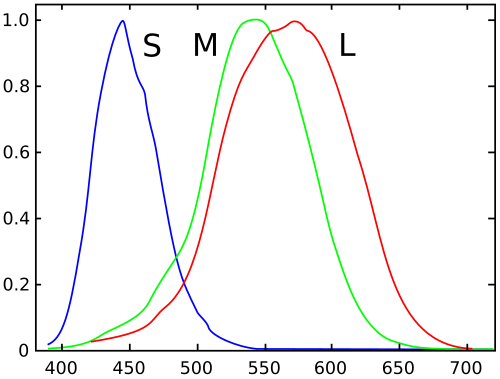General Discussion
Related: Editorials & Other Articles, Issue Forums, Alliance Forums, Region ForumsYour eyes are Very Sensitive
A human eye can detect a single photon. (It is not easy, but a subject in total darkness for while can detect a single photon fired into the eye as a diffuse little blur of light.)
Sometimes looking at a bright, flatly colored field (like a clear blue sky... or a computer monitor) we can see squiggles of very bright light... fast moving dots with "trails" that end up looking like spermatozoa made of pure light. These are caused by individual white blood cells (much bigger than red blood cells) moving through capillaries in the eye.
That's pretty sensitive!
A very fun fact about our color vision—South American Moneys and Old World monkeys and apes have a common ancestor, of course, but the two populations separated before monkeys had color vision. Both populations developed Red/Green/Blue color vision independently. Same problem. Same specific solution. But developed independently.
Why?
Probably because fruit was here before we (primates) were, evolving colors that would stand out against green. (Plants want fruit to eaten to spread the seeds, hences the non-camouflage) The *problem* was pre-defined—maximize seeing a dot of orange or yellow or red in a field of green. Both sets of proto-monkeys had the same starting equipment and the same problem, and both developed a three color sensing system based on the same three colors.
So they way we see color was indirectly dictated by the way birds or insects or some othe mammal saw color. Fruit became fruit colored to appeal to somebody other than us, then we developed a system to see that advertising. (Meanwhile, based on whether monkeys were good or bad at spreading the seeds the fruit colors would be selected to be easier or harder for us to see, and so on.)
hfojvt
(37,573 posts)Cirque du So-What
(25,988 posts)as a means of attracting birds, who have developed a more acute, discriminatory sense of color than humans.
cthulu2016
(10,960 posts)Bird eyes would dictate the appearance of fruit and then the appearance of fruit dictates our eyes.
hunter
(38,328 posts)Our nocturnal furry little ancestors lost two of four color receptors and then later, when they took to the trees and foraging in daylight, evolution kludged a new color receptor from the remaining red/green receptor.

Normalised responsivity spectra of human cone cells (wikipedia)
The responsivity curves of birds' and reptiles' four color receptors are evenly spaced across the spectrum.
Creationists are fond of using the human eye as an example of something that couldn't "just evolve," but when you look at the engineering it's immediately apparent the human eye is not the work of an Omnipotent Creator who was looking out for Man first. Instead it's something hacked together by a process of evolution in our primate ancestors.